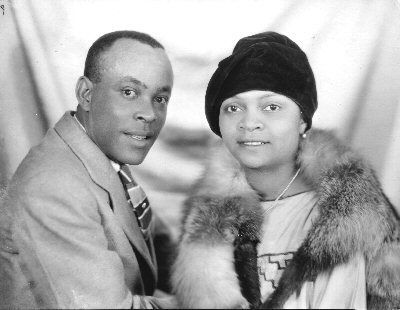
Although her life was short, Florence was a performer for almost thirty years, and had associations with a remarkable array of fellow performers, associates, admirers and friends. Many of these are still well known today. This list gives brief information about many such people and points to web-based information about them where it is known to exist. I will continue to add to the list with new information or names (scroll down or use the hyperlinks to go to individual sections
Fellow
performers
Supporters
& admirers
Contemporaries
& successors

Ulysses 'Slow Kid' Thompson
U.S. Thompson tells how Florence got into showbiz
Born in Prescott, Arkansas, in 1888, Kid Thompson, as his friends called him, was Florence's devoted husband till her death. A brilliant dancer and comedian in his own right, he learned his trade in the tough world of circuses and traveling medicine shows in the early years of the century. Recognizing Florence's genius he subjugated his own career to be her manager, promoter, minder and companion. After her death, he continued performing, traveling around the world, including China and Australia, until the late Thirties.
In later years he married Dr Gertrude Curtis, noted in her own right as New York's first black woman dentist (1911). She was also the widow of lyricist Cecil Mack (R. C. McPherson) who contributed the words for many of the Williams and Walker show songs, such as "He's a Cousin of Mine" and "That's Why They Call me Shine", but is best known for the words to "The Charleston." Kid Thompson outlived Dr Curtis, so ironically Florence Mills' husband ended up owning part of the copyright of the music she was famed for dancing in the Twenties.
Kid Thompson lived to 101, dying in the home of a relative in Little Rock, Arkansas in 1990.
The Mills Sisters
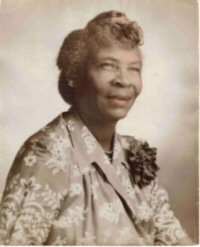
Olivia Mills (later Olivia Wiltshire)
(Photo courtesy Sandra Wade-Hills
& Wiltshire family)
By the time she was 14 years old Florence was performing as part of the Mills Sisters, with her sisters Olivia and Maude. Olivia did Aida Overton Walker impersonations and was a very capable dancer. She retired to raise a family in 1915. Maude went on to have a successful career in showbiz until the depression. I have not been able to locate a photo of Maude (help!) but you can hear her sing "Anything That Happens Just Pleases Me" accompanied by Fats Waller.

The great ragtime piano player, co-author of Shuffle Along and composer of gems like "Memories of You, '"I'm just Wild About Harry", and "Love Will Find a Way" lived a long life but always remembered Florence. You can hear him interviewed here, and playing his "Charleston Rag" (courtesy of Max Morath): Eubie Blake interview

Generally known as the "Dean of African American composers", he was a brilliant musician, composer and arranger in the fields of classical music and jazz. Apart from his remarkable symphonies, operas & ballets based on African American themes, his long life also saw him become a style setter for film and TV theme music. An outstanding human being whose reputation will live. For details of his friendship and association with Florence see Levee Land, William Grant Still and Florence Mills

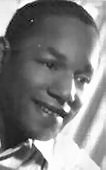
Hyacinth Curtis &
Clarence Robinson
Listen to some of Hyacinth's memories of Florence after 70 years
When Florence went to England in 1926 with Blackbirds two of her fellow performers were Hyacinth Curtis, as one of the high stepping 'Plantation Wildflowers' (or 'Cossacks' or 'Trotters', whatever the scene demanded), and Clarence Robinson who was featured in many of the dance specialties that enthralled English audiences. Too soon Hyacinth would be one of the flower girls at Florence's funeral. She and Clarence married and she had a thirteen year career as a Cotton Club dancer while Clarence became one of the most highly regarded choreographers of the increasingly popular black dance scene, at the Cotton Club and in many other shows, including the original stage show of Cabin in the Sky. Hyacinth lived quietly in Harlem till her recent death, still with a clear recall of her days of stardom.
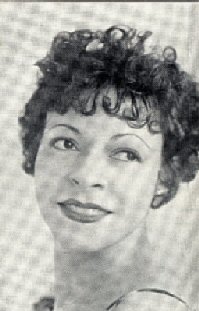
Maude
Russell (The Slim Princess)
Her memories of Florence Mills
Aged 104 at her death in 2001, Maude Russell Rutherford was in Shuffle Along and was the first woman to dance the Charleston on stage in Liza (1922). She joined Florence Mills in Plantation Revue and Dixie to Broadway and played in later Blackbirds shows and at the Cotton Club. (apologies for quality of mini recorder).
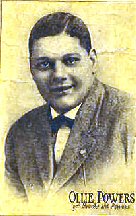
Ollie
Powers
(Drummer and singer)
Was one of Florence's fellow performers at the Panama Cafe in Chicago and was a partner of Shelton Brooks in many shows. Louis Armstrong loved his singing. The link above is to the commemorative site maintained by his grandson musician namesake Ollie Powers. Listen to Ollie Powers Harmony Syncopators on the Red Hot jazz site, including Ollie singing a Shelton Brooks song.
Dan Avery & Charles HartFlorence's first professional engagement came in 1903 when, as "Baby Florence," she featured in a guest spot singing Aida Overton Walker's specialty number "Miss Hannah from Savannah" in the Avery and Hart production of the Williams and Walker show The Sons of Ham. Avery and Hart were the number two Company of Williams and Walker, with Charles Hart being the Bert Williams imitator. Unlike the many other Williams imitators, Hart had actually been Williams' understudy in the main company. They had successful careers for many years, including in England, and were on the same Black vaudeville circuits as Florence around 1910 but were both dead by the time Florence found fame.
BonitaOne of Florence's early mentors in showbiz was famous burlesque performer Bonita, sometimes billed as "Bonita and (Lew) Hearn," star of the long running show Wine, Woman and Song, who enrolled Florence as one of her 'picks' until she was seized as an underage performer by the Gerry Society. In later years Florence told her "You taught me how to put over a song."
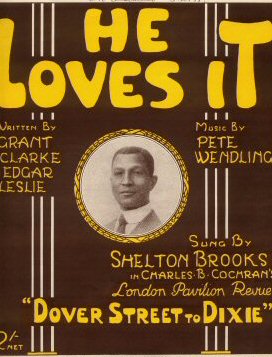
Shelton
Brooks
(co-star of several of
Florence's shows shows;
composer of "Darktown Strutters Ball" & " Some of These
Days")
This list will continue to be expanded. Meantime from Scott Alexander's RedHotJazz archive try:
Clarence Williams & Eva Taylor
Johnny
Dunn
(Cornet star of the Plantation
Orchesrta)
Thomas
Morris
(A fellow member of the Tennessee Ten)
Plus
Adelaide
Hall
(courtesy Earl Okin,
noted Duke Ellington fan)
Although her memory is still treasured by many African Americans and not a few others also, there has been a small band of people who have been particularly effective in keeping Florence's memory alive. These include:
In 1943 when Duke Ellington gave his first Carnegie Hall Concert, he included a segment of 'Portraits' of his nominations of the all time greatest black performers, identified as Bert Williams, Bill 'Bojangles' Robinson and Florence Mills. His 'Portrait of Florence Mills' was actually the haunting piece 'Black Beauty' written and recorded by him originally in 1928, shortly after her death. This piece of Ellingtonia has been the single biggest factor in preserving her memory over the years, having been recorded many times by Ellington and numerous others, as well as being included in a ballet by the Alvin Ailey Dance Theatre. There are many Ellington links on the Web but a good starting point is the Home Page of the New York chapter of TDES (The Duke Ellington Society ) which has many other links.
Duke Ellington was synonymous in his day with smooth sophistication, a silver-tongued flatterer of the ladies, so it is no surprise that when a magazine for black men to rival Playboy was published, the publishers named it after him: See him on the cover of Duke Magazine
For lots more Ellington links, see David Palmquist's all singing, all dancing, comprehensive Ellington on the Web
See also Duke in Australia 1970
When the youthful, 17 years, genius of British classical music saw Florence Mills and her Plantation Orchestra in 1923 in London it was an experience that shaped the rest of his life. His masterpiece Rio Grande was an attempt to capture the spirit of their performance in classical form. When she died he wrote his delicate, touching Elegiac Blues as a parting tribute.
Social historian and devoted friend of ageing performers Delilah Jackson, through her Black Patti Foundation, has done a huge amount to honour and preserve the memory of the great black performers of yesteryear, whether they were famous stars or just great troupers. She was a close friend of Kid Thompson in his later years, and was devoted to the memory of Florence Mills, having written and lectured on her career many times. Sadly Delilah passed away in 2013, after a long illness but she will be remembered for her devotion to the entertainers of several generations and her commitment to maintaining their memory. Delilah's immense collection of historical material is now housed at Emory University

Stephen Bourne
(with Aunt Esther)
(photo by Val Wilmer)
English writer and TV/radio scriptwriter Stephen Bourne has done much to keep Florence's memory alive through BBC radio programs such as Black in the West End, Sophisticated Ladies, One Mo' Time. His book, 'Black in the British Frame' (originally Cassell, London & Washington, 1998 but since revised) is a fascinating chronicle of the trials and tribulations of native born black entertainers in Britain in achieving recognition for their talent in the face of the challenge of their more famous transatlantic counterparts. Stephen played an important role in the re-discovery of Adelaide Hall after a period of relative obscurity in England. Here is a link to his books on Elisabeth Welch, Ethel Waters and Butterfly McQueen (of Gone with the Wind fame). More recently he has released a book on Nina Mae McKinney (The Black Garbo). Stephen has also been a valued friend to me in my research activities. The picture is of Stephen with his much-loved Aunt Esther who inspired his passion for Black entertainment history.
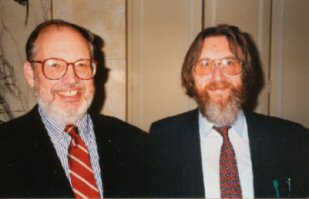
Richard Newman (on left)
Prolific researcher and author on African American topics Richard Newman (known as Dick to his friends) contributed material on Florence to numerous sources, including Notable Black American Women ( Jessie Carney Smith Ed., Detroit, Gale research, 1992), the excellent book on African American history Everybody Say Freedom (R Newman & M Sawyer, Plume, New York, 1996) and an article on Florence's Aeolian Hall performance. "East of Broadway: Florence Mills at Aeolian Hall." in the Sonneck Society Bulletin for American Music 20, no. 3 (1994). Sadly he passed away recently before he could finish a planned book on Florence Mills, which may yet be produced posthumously. The picture above was taken at the 1996 "April in Paris" Conference, run jointly by the Sorbonne and the Du Bois Institute at Harvard, shortly after Richard had given a lecture on Florence Mills. I sent him the photo of us together later, captioning it "The Mills Brothers."
Below are links to some famous African American entertainers who were either contemporaries of Florence, or successors who starred in the later editions of her Blackbirds shows:
T
Ethel Waters followed the same black vaudeville circuits as Florence in the teens of the century, temporarily replaced her at the Plantation Club when Florence took her show, Plantation Revue, on the road. and was a featured star in Blackbirds of 1930. She went on to an illustrious career in stage and film
T
Sixteen year old Josephine Baker joined Shuffle Along, the show that had made Florence a star, as a chorus girl. Her zany antics soon earned her special billing as 'The comedy chorus girl'. A chance opportunity to star in Paris in an all black show in 1925 made her the toast of Paris and led to a glittering international career that lasted many years.
T
Bill 'Bojangles' Robinson was a good friend to Florence in her early years of struggle, giving her tap dancing lessons in Chicago in 1915 and encouraging influential people to see her and the Panama Trio at the Panama Club. Though admired for his remarkable tap dancing, it wasn't till he was 50 that he achieved true public fame, through starring in Blackbirds of 1928, and going on to greater stage and screen successes.
T
The last of the Lew Leslie Blackbirds shows, Blackbirds of 1939 wasn't a great success but its glamorous and talented young star Lena Horne went on to greater fame and is still revered today, in her 80s, as one of the greatest performers of the century. She recounted in her biography Lena (Lena Horne & Richard Schickel, Andre Deutsch, London, 1966) how, when rehearsing for the show, Lew Leslie would describe Florence to her "and I'd see his eyes fill with tears as he remembered her."
T
Valaida Snow was a beautiful and talented trumpet player, singer, songwriter and dancer, sometimes nicknamed 'Little Louis'. She had been a child performer like Florence and was encouraged in her career by her. She was in the Sissle & Blake show Chocolate Dandies along with Josephine Baker and other Shuffle Along stars. She played a Florence Mills type role in Blackbirds of 1934, which toured England successfully. She had perfect pitch and on one occasion told Eubie Blake his tuning fork was out of tune. Refusing to believe her, he took it to a music shop which confirmed it was very slightly bent.
T
Blackbirds of 1936, again based in England, had limited success but was notable for its inclusion of the remarkable dancing Nicholas Brothers whose achievements in their all too restrictive Hollywood movie appearances must surely be amongst the most extraordinary artistic and athletic performances of all time.
T
Perry Bradford Early associate. Composer of "Crazy Blues"
T
Jesse Shipp One of the 'Frogs', Florence's first manager; friend over many years